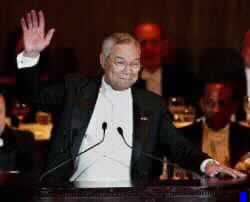HIGHLIGHTS: Graham Says Development Underscores Need For Administration to Reorder its Foreign Policy||N. Korea Already Has 2 Nuclear Weapons in Hand, Says Senator, & Could Produce More||Graham Accuses Administration of Bad Faith Delaying Disclosure of N. Korea's Admission of Nuclear Programme until after Congress-Senate Vote on Iraq||Disclosure Puts Bush Administration on the Spot||A Nuclear-Armed North Korea Is a Huge Risk to World Peace & Security, Condoleezza Rice||Development Tops Agenda of Chinese-American & Asia-Pacific Economic Cooperation summits in Texas & Los Cabos, Mexico Thursday & Saturday Respectively|| STORY: Top U.S. officials said on Sunday they would discuss with "friends and allies" a response to what they view as the scrapping of a 1994 agreement for North Korea to freeze its nuclear arms program, as a key U.S. senator warned that the communist state was a bigger threat than Iraq.
In appearances on several talk shows, U.S. Secretary of State Colin Powell said the administration was taking at face value statements by North Korea that its newly disclosed program to produce enriched uranium -- a nuclear weapons ingredient -- "nullified" the 1994 Framework Agreement.
"Well, when you have an agreement between two parties and one says it's nullified, then it looks like it's nullified," Powell said on ABC's "This Week with George Stephanopoulos".
The developments underscore a need for the Bush administration to reorder its foreign policy, which is now focused on making Iraq dismantle its weapons of mass destruction programs, said U.S. Senate Intelligence Committee Chairman Robert Graham, a Florida Democrat.
North Korea has two nuclear weapons already in hand, the potential to build more, and long-range missiles under development that could hit the United States, making it a bigger threat than Iraq, Graham said.
"If you put the two, North Korea and Iraq, on the scales and ask the question, which today is the greater threat to the people of the United States of America, I would answer the question North Korea. And I think that needs to be part of the rebalancing of our foreign policy priorities," he said on CBS's "Face the Nation".
He also criticized the Bush administration for delaying until last week its disclosure that North Korea had admitted on October 4 to violating the agreement, by seeking to make enriched uranium. Administration officials rejected the criticism.
Under the 1994 deal, called the Agreed Framework, North Korea pledged to freeze operation and construction of graphite nuclear reactors suspected of being a part of a covert weapons program.
In exchange, the United States would ship 500,000 tons of fuel oil annually to North Korea and help it build two "light-water" nuclear power reactors, whose by-products cannot be easily used to produce nuclear weapons.
Asked if Washington would cut off the oil shipments, Powell said, "We're looking at all of the things that rest on the agreed framework to see what is in our interest to keep doing, what is in our interest not to keep doing."
The United States was not now discussing possible new economic sanctions, Powell said.
EVALUATING RESPONSE
He said Washington was evaluating its response with "friends and allies", including South Korea, Japan, Russia, and China. Talks would continue at a summit of Asia-Pacific nations next weekend in Mexico.
Diplomacy must move carefully, Powell said, noting that it was essential that stored plutonium at a facility at Yongbyon remain under international monitoring, as provided under the agreement. It would create an "extremely grave situation" if North Korea were to withdraw the plutonium, which can be used to make nuclear weapons, from supervision, he said.
The Bush administration assumes North Korea "might have one or two" nuclear weapons, Powell said. He said he did not want to speculate about the possibility of a U.S. military strike against North Korea, but said the United States was trying to resolve the situation peacefully.
Graham said he suspected the arms dispute would come to the brink of military force, as it did in 1994, but said the Bush administration would "take diplomacy quite a long way".
Speaking on CNN's "Late Edition," U.S. national security adviser Condoleezza Rice said, "This is a situation that cannot remain unresolved ... a nuclear-armed North Korea is a huge problem for peace and security."
The nuclear revelations have upset the delicate balance on the Korean Peninsula, one of the Cold War's last flash points.
They are likely to feature prominently in discussions on Friday when U.S. President George W. Bush meets Chinese President Jiang Zemin at Bush's Texas ranch.
Bush will also hold a three-way meeting with Japanese Prime Minister Junichiro Koizumi and South Korean President Jim Dae-jung at the Asia-Pacific Economic Cooperation summit in Los Cabos, Mexico on Saturday.
Bush has called North Korea part of an "axis of evil", along with Iraq and Iran, that threatens to transfer weapons of mass destruction to terrorists. Powell said on NBC's "Meet the Press" that North Korea was much stronger militarily than Iraq -- which Bush is considering going to war against -- but that North Korea was burdened by its deep poverty.
Powell rejected charges that the administration delayed telling members of Congress about North Korea's arms program to avoid affecting their vote authorizing military force against Iraq. He said several members had been briefed about North Korea in advance of the Iraq vote earlier this month.
"It was a separate issue of enormous importance and gravity, and no politics were being played with it," Powell said on Fox News Sunday. But Graham said the White House had demonstrated a pattern of selectively declassifying information when in the interests of the administration.
PHOTO CAPTION
U.S. Secretary of State Colin Powell makes a point at during his address to the 57th annual Alfred E. Smith Memorial Foundation dinner in New York on October 17. REUTERS/Jeff Christens
- Author:
& News Agencies - Section:
WORLD HEADLINES


 Home
Home Discover Islam
Discover Islam Quran Recitations
Quran Recitations Lectures
Lectures
 Fatwa
Fatwa Articles
Articles Fiqh
Fiqh E-Books
E-Books Boys & Girls
Boys & Girls  Women
Women










